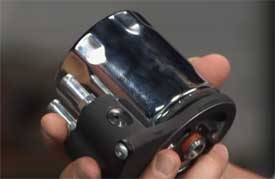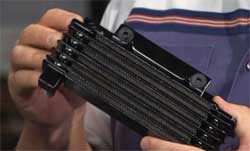Oil Coolers
Everyone knows that oil is an engine’s lifeblood, so how do you keep your car’s blood from boiling? Well, no matter whether the primary cooling system on your car is coolant or air, the secondary cooling system on all engines is oil. And that can be greatly enhanced with a slight modification. And to give us some pointers, Lynden Abel, general manager of Patriot Harley Davidson in Fairfax, Virginia. Lynden welcome back to the show.
LYNDEN ABEL: Thank you, Pat.
PAT GOSS: Alright, give us your take on oil coolers.
LYNDEN ABEL: OK, well as you were discussing, everyone is familiar with the facts that oils primary job is to lubricate. But so many people do not recognize that the secondary purpose is to cool. And it’s a very important part of its job. What we have here is an oil cooler from a late model Harley Davidson. And this is essentially just a radiator. And oil comes in one side and goes out the other. In between are thin pipes attached to these fins, which very effectively dissipate heat. So as the oil is routed through here it’s shedding an awful a lot of it’s heat. One of the popular misconceptions with an oil cooler is that they only work at speed. And while there is no question that they are more efficient at exchanging heat at speed, even in stop and go traffic or not moving at all it does make a big difference in how much heat is shed out of your oil. And if you don’t believe that just put your hand up next to an oil cooler when it’s parked in traffic you’ll feel plenty of heat coming off of it.
PAT GOSS: And for those of you who don’t know why this is so important, oil gets moisture in it and that moisture continually builds up unless the oil temperature reaches at least 212 degrees to boil the water out of the oil.
LYNDEN ABEL:  Quite right and that’s why it’s important to get a quality oil cooler that‘s designed for your vehicle that had a thermostat in it. This is again the same example of a Harley Davidson oil cooler and this has a thermostat inside it, which does two things, one it doesn’t overcool the oil. So if you’re out in the winter time riding around it’s not keeping that oil you know below 200 degrees, its not allowing it enough to boil off that moisture. But also it allows the oil, even in summer time, to come up to temperature more quickly because its just circulated through the engine til it comes up to proper operating temperature and then it’s allowed to do what it needs to do.
Quite right and that’s why it’s important to get a quality oil cooler that‘s designed for your vehicle that had a thermostat in it. This is again the same example of a Harley Davidson oil cooler and this has a thermostat inside it, which does two things, one it doesn’t overcool the oil. So if you’re out in the winter time riding around it’s not keeping that oil you know below 200 degrees, its not allowing it enough to boil off that moisture. But also it allows the oil, even in summer time, to come up to temperature more quickly because its just circulated through the engine til it comes up to proper operating temperature and then it’s allowed to do what it needs to do.
PAT GOSS: Very important point and you know folks, any engine can benefit from an oil cooler, but you have to make sure that you buy a quality part, and that that quality part has a thermostat in it, and that it is properly installed. Lynden thank you so much.
LYNDEN ABEL: Thank you.






